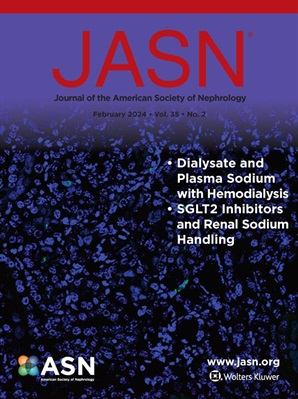How to Cure Autoimmune Glomerulonephritis and Podocytopathies.
IF 9.4
1区 医学
Q1 UROLOGY & NEPHROLOGY
引用次数: 0
Abstract
Autoimmune glomerulonephritis (GN) and podocytopathies are immune-mediated kidney diseases with different clinical presentations and histotypes. Traditionally, proteinuria and histotypes are used for prognosis prediction and hence define intensity of immunotherapy. Renin-angiotensin system and sodium-glucose transporter 2 inhibitors are considered as "supportive care" and control of proteinuria, seems a primary treatment goal without reasoning the cause of proteinuria. We propose to refine these concepts based on the shared pathophysiology of these diseases: 1. Disease acuity as the primary determinant of therapy. Rapidly progressive GN, relapsing GN, and chronic GN require different priorities. Rapidly progressive GN depends on the level and nephrotoxicity of the involved antibodies and complement activation, and may require immediate complement inhibition and antibody removal from the circulation before a B cell-targeting therapy is initiated to control de novo autoantibody production. 2. Relapsing or chronically active disease need long-term control of immunological activity with a B cell-targeting monotherapy, in case of single autoreactive lymphocyte clones, e.g., in ANCA vasculitis or anti-nephrin/anti-PLA2R-nephrotic syndrome. In contrast, diseases with numerous autoantigens/clones, i.e., lupus nephritis or anti-phospholipid syndrome should benefit from combination therapies, similar to kidney transplantation. 3. All forms of GN and most relapsing podocytopathies lead to glomerulosclerosis and nephron loss, i.e., CKD. This implies CKD management following the latest KDIGO CKD risk matrix and treatment recommendations. In relapsing GN/podocytopathies, CKD care is the second treatment priority; in chronic GNs it becomes the first treatment priority in contrast to "supportive care". In relapsing and chronic disease, proteinuria levels may represent either activity, CKD or both; hence, proteinuria alone does not inform treatment choices. This review aims to overcome existing hurdles by redefining treatment pritorities in GNs and podocytopathies based on the underlying autoimmune pathomechanisms to define immunotherapy and by implementing CKD care for conceptual clarity and better long-term outcomes.如何治疗自身免疫性肾小球肾炎和足细胞病。
自身免疫性肾小球肾炎(GN)和足细胞病是免疫介导的肾脏疾病,具有不同的临床表现和组织类型。传统上,蛋白尿和组织分型用于预测预后,从而确定免疫治疗的强度。肾素-血管紧张素系统和钠-葡萄糖转运蛋白2抑制剂被认为是蛋白尿的“支持性护理”和控制,似乎是一个主要的治疗目标,而没有解释蛋白尿的原因。我们建议基于这些疾病的共同病理生理来完善这些概念:1。疾病敏锐度是治疗的主要决定因素。快速进行性、复发性和慢性GN需要不同的优先级。快速进展的GN取决于相关抗体和补体激活的水平和肾毒性,可能需要在开始B细胞靶向治疗以控制新生自身抗体产生之前立即抑制补体并将抗体从循环中去除。2. 复发或慢性活动性疾病需要用B细胞靶向单药治疗来长期控制免疫活性,在单一自身反应性淋巴细胞克隆的情况下,例如在ANCA血管炎或抗肾素/抗pla2r肾病综合征中。相反,具有大量自身抗原/克隆的疾病,如狼疮肾炎或抗磷脂综合征,应受益于联合治疗,类似于肾移植。3. 所有形式的GN和大多数复发的足细胞病都会导致肾小球硬化和肾单位损失,即慢性肾病。这意味着CKD管理遵循最新的KDIGO CKD风险矩阵和治疗建议。在复发的GN/足细胞病变中,CKD护理是第二优先治疗;在慢性GNs中,与“支持性护理”相比,它成为首要的治疗重点。在复发和慢性疾病中,蛋白尿水平可能代表活动,CKD或两者兼而有之;因此,蛋白尿本身并不能作为治疗选择的依据。本综述的目的是克服现有的障碍,根据潜在的自身免疫病理机制重新定义GNs和足细胞病的治疗重点,以定义免疫治疗,并通过实施CKD护理来明确概念和更好的长期预后。
本文章由计算机程序翻译,如有差异,请以英文原文为准。
求助全文
约1分钟内获得全文
求助全文
来源期刊
CiteScore
22.40
自引率
2.90%
发文量
492
审稿时长
3-8 weeks
期刊介绍:
The Journal of the American Society of Nephrology (JASN) stands as the preeminent kidney journal globally, offering an exceptional synthesis of cutting-edge basic research, clinical epidemiology, meta-analysis, and relevant editorial content. Representing a comprehensive resource, JASN encompasses clinical research, editorials distilling key findings, perspectives, and timely reviews.
Editorials are skillfully crafted to elucidate the essential insights of the parent article, while JASN actively encourages the submission of Letters to the Editor discussing recently published articles. The reviews featured in JASN are consistently erudite and comprehensive, providing thorough coverage of respective fields. Since its inception in July 1990, JASN has been a monthly publication.
JASN publishes original research reports and editorial content across a spectrum of basic and clinical science relevant to the broad discipline of nephrology. Topics covered include renal cell biology, developmental biology of the kidney, genetics of kidney disease, cell and transport physiology, hemodynamics and vascular regulation, mechanisms of blood pressure regulation, renal immunology, kidney pathology, pathophysiology of kidney diseases, nephrolithiasis, clinical nephrology (including dialysis and transplantation), and hypertension. Furthermore, articles addressing healthcare policy and care delivery issues relevant to nephrology are warmly welcomed.

 求助内容:
求助内容: 应助结果提醒方式:
应助结果提醒方式:


